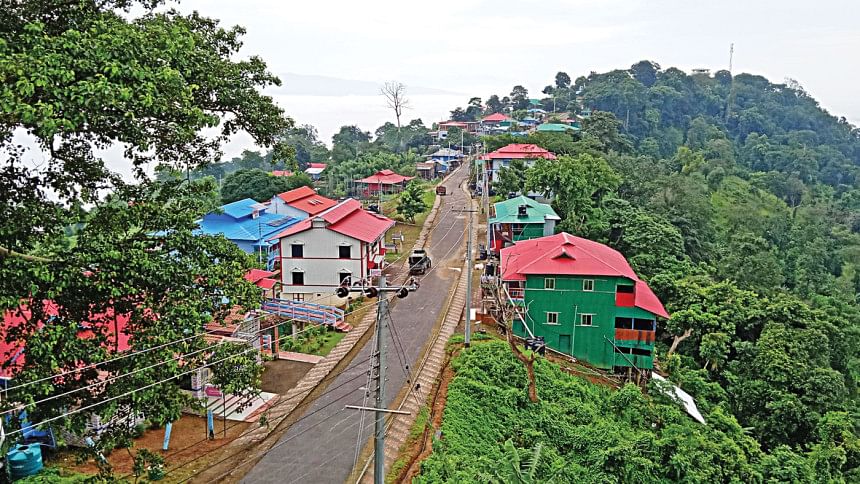Tourism recovering

Hotels and resorts have seen a surge in tourist numbers in the last couple of months as young people are leading the recovery of an industry that had hit rock bottom at the height of the coronavirus pandemic.
Winter is the peak season for the tourism industry in Bangladesh, but it is going through a tough time because of the crisis-induced business slowdown.
The situation has improved recently compared to that of first several months after the deadly pathogen hit the country in March.
There had been no tourists until September in Rangamati's Sajek, frequented by tourists thanks to its pristine natural beauty.
"Tourists started to turn up from October and their numbers have reached pre-pandemic levels," said Suparna Debbarman, president of the Cottage Malik Samity of Sajek, a forum of owners.
Almost all cottages and resorts are houseful on Fridays and Saturdays. Sajek has 90 resorts and cottages that can accommodate 2,000 visitors.
"Only younger people are going out for travelling purpose," said Nasir Majumder, a director of the Travel Operators Association of Bangladesh.
About 70 per cent of tourists prefer visiting Cox's Bazar, the Chittagong Hill Tracts, Sundarbans and Sylhet, according to industry people.
Mahmud Russel, director for sales and marketing at the Royal Tulip Sea Pearl Beach Resort & Spa in Cox's Bazar, said the business of the hotels and resorts in Cox's Bazar had improved a bit compared to the initial months of the outbreak.
The occupancy rate at the 385-bed hotel came down to 40 per cent whereas it usually remains fully booked during the peak season, which runs from December to March.
The business hotel segment is yet to see much improvement as corporate booking is almost nil and business conferences and meetings are taking place on digital platforms.
"The occupancy rate has increased to 52 per cent on average in the last three months but it is yet to reach a satisfactory level," said Md Alamgir, managing director of Pan Pacific Sonargaon Dhaka. Before the pandemic, the occupancy rate was 70 to 80 per cent.
The industry lost about Tk 7,000 crore in 2020 as the number of boarders had come to a historic low, according to Khaled Ur Rahaman, co-chairman of the Bangladesh International Hotel Association.
Due to the Covid-19 outbreak, many foreign tourists cancelled their hotel bookings, resulting in significant financial losses for the industry, particularly in Dhaka, Cox's Bazar, Sylhet, and Chattogram.
According to an assessment by Santus Kumar Deb, an associate professor of the department of tourism and hospitality management at the University of Dhaka, the industry faced a revenue loss of Tk 9,705 crore from March to August.
Around 309,500 people who were involved in the sector lost their jobs, he said.
Mohammad G Jishan, assistant manager for sales at Radisson Blu Dhaka Water Garden, said the occupancy rate dropped to 30 per cent from around 80 per cent in the pre-pandemic period.
The market size of the domestic tourism segment was around Tk 6,000 crore in 2019 and it declined to Tk 1,500 crore in 2020, said Majumder, also the managing director of Century Travel Services.
He said people were not travelling much as they are not mentally at peace and their disposable income had fallen drastically.
"It will take some time for the tourism industry to return to its previous shape," Majumder added.
Mofizur Rahman, managing director of private airline NovoAir, said the flow of travellers had been increasing gradually since the resumption of flights in June. The cabin factor had reached 80 per cent of the pre-Covid days.
"From the beginning of January, we, however, have been seeing a downturn."
"What we see is a lack of interest in travelling among people. The worries of the second wave may be the reason. It appears that buying power among people is eroding," he said.
Kamrul Islam, general manager for public relations of US-Bangla Airlines, however, said domestic passenger flow went up to the pre-Covid-19 level because of the recovery in travels to tourism destinations.
"Many people and families used to travel to neighbouring countries before the pandemic. Now, they are visiting domestic tourist spots as many countries are not granting visas for tourism purpose. This is a good opportunity for the tourism industry in Bangladesh to provide improved services," he added.

 For all latest news, follow The Daily Star's Google News channel.
For all latest news, follow The Daily Star's Google News channel. 



Comments